Ten Unforgettable Female Characters
This week's Top Ten Tuesday topic, as suggested by Jamie at The Broke and the Bookish, is "The Top Ten Characters Who ____________." She has left it up to individual bloggers to complete the sentence. I chose to write about The Top Ten Female Characters Who Are Unforgettable. In the spirit of this blog, all 10 characters are the creation of female authors. Admittedly, this is an idiosyncratic list; it discusses characters I liked and/or found memorable. It is not intended to be an objective or definitive list. (I don't want readers scolding me for omitting Scarlett O'Hara.)
I hope you'll comment with some of your favorite female characters.
Characters are discussed in the order in which the books were published.

Elizabeth Bennett, Pride and Prejudice by Jane Austen (1813)
Lizzie Bennett is one of the most popular female characters in all of literature, and for good reason. She is confident and self-possessed, capable of both charming wit and biting commentary, attractive without being able to rely on her appearance, and interested in marriage but only with a man worthy of her and whom she actually loves. Yes, she is judgmental and opinionated, "prejudiced" as Austen would say, occasionally hot-tempered, and prone to misplaced fits of righteous indignation. But those all-too-human foibles only make her more loveable. As portrayed by Jennifer Ehle in the 1995 BBC production with Colin Firth, she is radiant and irresistible. Only someone with a stone for a heart could fail to be charmed by her Lizzie Bennett.

Anna Karenina, Anna Karenina by Leo Tolstoy
One of the first modern women in literature, Anna Karenina is a beautiful, sophisticated, and intelligent aristocrat who rejects societal constraints and the double standard applied to adulterous men and women by pursuing an extra-marital relationship with Count Vronsky. She is an ardent romantic who desires happiness on her own terms and pays the price for her iconoclastic attitude. Anna shares her loving heart with her children, to whom she remains devoted, despite her rejection of their father. Her fiercely independent spirit, dedication to love at any cost, and maternal streak make Anna Karenina an admirable, if flawed, character. In short, she is unforgettable precisely because she is so fully human.

Esperanza Cordero, The House on Mango Street by Sandra Cisneros (1984)
Young Esperanza knows little beyond her Chicago barrio. She is full of dreams large and small, quirky in the way of all memorable young girls, vulnerable in countless ways but with an inner toughness born of poverty, struggle, and the patience that comes from doing without. The vignettes in The House on Mango Street allow us to get to know Esperanza in much the same way we become familiar with real people: in bits and pieces, trying to complete the picture so we can figure the person out and decide what kind of relationship we would like to have with her. By the end of this deceptively simple 110-page novel, the reader is certain that Esperanza is a very special girl, destined for life beyond her neighborhood. Cisneros has created a very memorable character for young readers -- and everyone else.
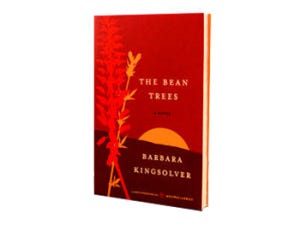
Taylor Greer, The Bean Trees by Barbara Kingsolver (1988)
High school senior Taylor Greer wants out of her tiny Kentucky town, and as soon as she is able, off she goes in her little VW bug, headed west to who knows what. A stop near an Indian reservation in Oklahoma becomes a life-changing moment, and soon she and her baby, Turtle, are settling in Tucson and trying to create a life for themselves. Taylor is gritty and resourceful but yearns for a family, which develops over time among a small group of outcasts, misfits, and unfortunates with whom she finds herself surrounded. Taylor's huge heart, compassion, and determination make her a young woman to admire and love -- and remember long after the reader puts the book down.

Lee Fiora, Prep by Curtis Sittenfeld (2005)
Sittenfeld's junior high protagonist is one of the most memorable teenage girls in literature. Hailing from a middle class family in Indiana, Lee is a scholarship student at a prestigious New England boarding school. Prep depicts her efforts to make friends, become self-sufficient, and pass her classes. Lee's desire to understand and be like her privileged classmates is palpable and heartbreaking. She is a sweet, earnest, bright, and ambitious girl worth more than most of her classmates put together, but try telling her that. Her struggle to create herself is full of awkwardness and embarrassment, laughter and love, accomplishments and disappointments. She is a young woman you will not soon forget.

Katniss Everdeen, The Hunger Games by Suzanne Collins (2008)
This choice might surprise some people, but I liked and admired Katniss for her devotion to family, selflessness, modesty, and unexpected depths of character. If Katniss were not so likeable, despite her intermittent prickliness, we wouldn't be so deeply invested in her success in the Hunger Games. Her mixed emotions about Gale and Peeta make Katniss more realistic and plausible, just like one of us, despite the unfamiliar and unforgiving setting and circumstances. As with Jennifer Ehle in Pride and Prejudice, the film version benefits mightily from the charisma of Jennifer Lawrence.
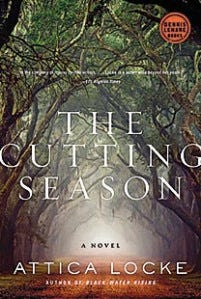
Caren Gray, The Cutting Season by Attica Locke (2012)
Locke's second novel channels James Lee Burke through a female perspective and protagonist. Caren Gray is the general manager of an antebellum plantation that doubles as a historic landmark visited by schoolchildren and the setting of wedding receptions and other posh events. She is building a life for her young daughter, Morgan, and herself. When the body of a migrant worker is discovered on the property line between the plantation and the adjacent corporate farm's property, Gray finds herself pulled into the plantation's brutal and sordid past. The Cutting Season reminds us, once again, of Faulkner's famous line: "The past is never dead. It's not even past." Gray is a typical concerned parent who quickly realizes she is a better detective than the ones working the case. But she is soon in over her head, as the murderer becomes an ever-increasing threat to Caren and Morgan. Locke has created a realistic, likeable, and gutsy young woman in Caren Gray, and it is a pleasure to watch her unravel the history of the plantation and, surprisingly, her own family. I'm hoping for another book featuring the estimable Ms. Gray.
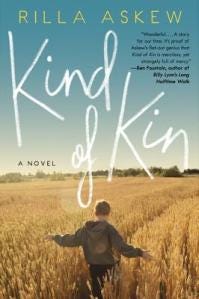
Georgia Ann "Sweet" Kirkendall, Kind of Kin by Rilla Askew (Jan. 2013)
If ever a young wife and mother had her hands full with challenges of every kind, it is Sweet Kirkendall of tiny Cedar, Oklahoma. Her husband is away much of the time working on a pipeline, leaving her to raise their clueless pre-teen son, Carl Albert, and care for her invalid father-in-law. Sweet’s father, Bob Brown, is arrested for harboring illegal aliens in his barn as a statement of Christian principle. That drops Bob’s 10-year-old grandson Dustin (and Sweet’s nephew) into her lap. Carl Albert resents Dustin, and the boys fight like angry Tasmanian devils. The plot weaves several other threads, both personal and political, into a tapestry of working-class Oklahomans (and Mexican immigrants, both legal and undocumented) struggling to support their families in an increasingly callous society. Sweet would not appear to be cut out to carry the many burdens of her family and town, yet the crucible of a battle over an anti-immigrant law allows her to discover her true character. She is a young woman with will, determination, and compassion who manages to hold herself and her family together. She is a character to admire and remember.
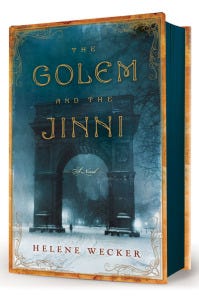
Chava, The Golem and the Jinni by Helene Wecker (April 2013)
Chava, the mystical golem of the title, is an immensely sympathetic character. She finds herself a stranger in a strange land when the German ship docks in New York City in 1899 and she learns that her owner/husband has died on the transatlantic journey. Seeing turn of the century Manhattan through her eyes is akin to reading a "first contact" story, as she does not know what to make of the city or its denizens, and those she befriends are nearly as perplexed by her not-quite-human persona. Chava's struggles with loneliness, adjustment, language, and the most mundane aspects of human activity, as well as her eventual encounter with the jinni, serve to make her, ironically, all the more human. She is in many ways the ultimate immigrant. She is a character worth knowing.
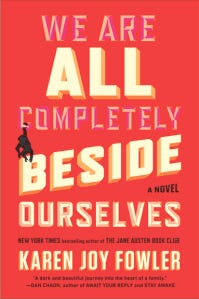
Rosemary Cooke, We Are Completely Beside Ourselves by Karen Joy Fowler (May 2013)
Rosemary is the narrator of Fowler's PEN/Faulkner Award-winning novel about a family in which Rosemary and a baby chimpanzee named Fern are raised from birth as "sisters." It's all part of her university professor/psychologist father's research. Things go relatively well for several years until something goes very wrong. Rosemary is now a 21-year-old UC Davis student looking back at her childhood and trying to make sense of what happened. When her older brother Lowell reappears in Davis after a decade spent incommunicado, she learns she has been burdened by the kind of misinterpretations commonly made by self-centered children. Rosemary is by turns funny, sardonic, clever, sullen, and depressed. Her relationships with friends, roommates, classmates, and her parents are fraught with confusion and misunderstandings. Rosemary is in many ways a "normal" American college girl; yet she also strikes others as slightly "off." As Rosemary says, they experience the "uncanny valley" sensation with her, since she is as much chimpanzee as Fern is/was human. The experiment, not surprisingly, had unintended consequences. Rosemary is an unforgettable character, as is her sister Fern.


